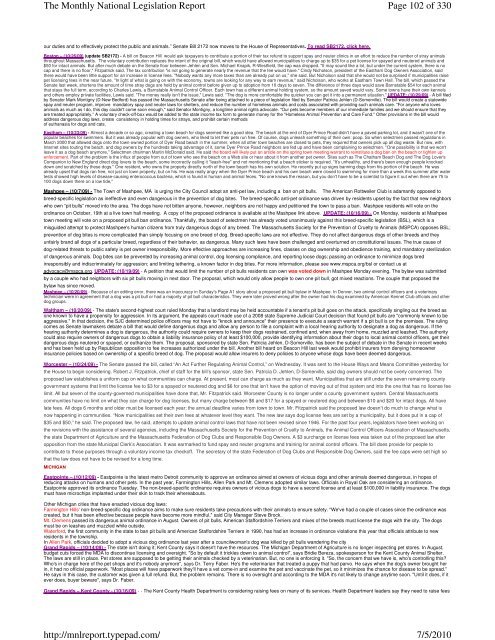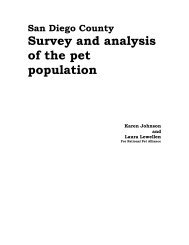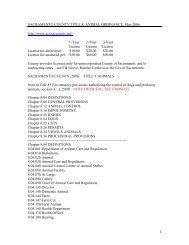Page 1 of 330 The Monthly National Legislation Report 7/5/2010 ...
Page 1 of 330 The Monthly National Legislation Report 7/5/2010 ...
Page 1 of 330 The Monthly National Legislation Report 7/5/2010 ...
You also want an ePaper? Increase the reach of your titles
YUMPU automatically turns print PDFs into web optimized ePapers that Google loves.
<strong>The</strong> <strong>Monthly</strong> <strong>National</strong> <strong>Legislation</strong> <strong>Report</strong>http://mnlreport.typepad.com/<strong>Page</strong> 102 <strong>of</strong> <strong>330</strong>7/5/<strong>2010</strong>our duties and to effectively protect the public and animals.” Senate Bill 2172 now moves to the House <strong>of</strong> Representatives. To read SB2172, click here.Boston – (10/26/09) (update SB2172) - A bill on Beacon Hill would ask taxpayers to contribute a portion <strong>of</strong> their tax refund to support spay and neuter clinics in an effort to reduce the number <strong>of</strong> stray animalsthroughout Massachusetts. <strong>The</strong> voluntary contribution replaces the intent <strong>of</strong> the original bill, which would have allowed municipalities to charge up to $35 for a pet license for spayed and neutered animals and$50 for intact animals. But after much debate on the Senate floor between Jehlen and Sen. Michael Knapik, R-Westfield, the cap was dropped. "It may sound like a lot, but under the current system, there is nocap and there is no floor," Fitzpatrick said. <strong>The</strong> tax contribution "is not going to generate nearly the revenue that the fee would have." Cindy Nicholson, president <strong>of</strong> the Eastham Dog Owners Association, saidthere would have been little support for an increase in license fees. "Nobody wants any more taxes than are already put on us," she said. But Nicholson said that she would not be surprised if municipalities raisepet licensing fees in the near future. "In light <strong>of</strong> what is going on with the economy, towns are looking for any way to earn revenue," said Nicholson, who works at Eastham Town Hall. <strong>The</strong> bill, which passed theSenate last week, shortens the amount <strong>of</strong> time stray dogs are held by animal control before given up to adoption from 10 days to seven. <strong>The</strong> difference <strong>of</strong> three days would save Barnstable $54 for each animalthat stays the full term, according to Charles Lewis, a Barnstable Animal Control Officer. Each town has a different animal holding system, so the amount saved would vary. Some towns have their own kennelsand others employ private facilities, Lewis said. "<strong>The</strong> money really isn't the issue," Lewis said. "<strong>The</strong> dog is more comfortable the quicker you can get it into a permanent situation." UPDATE: (10/29/09) - A bill filedby Senator Mark Montigny (D-New Bedford) has passed the Massachusetts Senate after being attached to a piece <strong>of</strong> legislation filed by Senator Patricia Jehlen (D-Somerville). <strong>The</strong> bill would create a statewidespay and neuter program, improve mandatory spay and neuter laws for shelters, and reduce the number <strong>of</strong> homeless animals and costs associated with providing such animals care. "For anyone who lovesanimals as much as I do, this day couldn't come soon enough," said Senator Montigny, a longtime animal rights advocate. "Our pets become members <strong>of</strong> our immediate families and we should ensure that theyare treated appropriately.” A voluntary check-<strong>of</strong>f-box would be added to the state income tax form to generate money for the "Homeless Animal Prevention and Care Fund." Other provisions in the bill wouldaddress dangerous dog laws, create consistency in holding times for strays, and prohibit certain methods<strong>of</strong> euthanasia for dogs and cats.Eastham – (10/23/09) - Almost a decade or so ago, creating a town beach for dogs seemed like a good idea. <strong>The</strong> beach at the end <strong>of</strong> Dyer Prince Road didn't have a paved parking lot, and it wasn't one <strong>of</strong> thepopular beaches for swimmers. But it was already popular with dog owners, who liked to let their pets run free. Of course, dogs unleash something <strong>of</strong> their own: poop. So when selectmen passed regulations inMarch 2000 that allowed dogs onto the town-owned portion <strong>of</strong> Dyer Road beach in the summer, when all other town beaches are closed to pets, they required that owners pick up all dog waste. But now, withInternet sites touting the beach, and dog owners by the hundreds taking advantage <strong>of</strong> it, some Dyer Prince Road neighbors are fed up and have been complaining to selectmen. "One possibility is that we won'tleave it as a dog beach anymore," Selectmen chairman Martin McDonald said. He said the board will likely put an article on the spring town meeting warrant to reinstitute a dog ban on the beach or tighten upenforcement. Part <strong>of</strong> the problem is the influx <strong>of</strong> people from out <strong>of</strong> town who see the beach on a Web site or hear about it from another pet owner. Sites such as <strong>The</strong> Chatham Beach Dog and <strong>The</strong> Dog Lover'sCompanion to New England direct dog lovers to the beach, some incorrectly calling it "leash-free" and not mentioning that a beach sticker is required. "It's unhealthy, and there's been enough people knockeddown and scratched by these dogs." One resident, who owns the property directly north <strong>of</strong> the town beach has his own solution. He recently put up signs banning dogs from his portion <strong>of</strong> the beach. He wasalready upset that dogs ran free, not just on town property, but on his. He was really angry when the Dyer Prince beach and his own beach were closed to swimming for more than a week this summer after watertests showed high levels <strong>of</strong> disease-causing enterococcus bacteria, which is found in human and animal feces. "No one knows the reason, but you don't have to be a scientist to figure it out when there are 75 to100 dogs down there on a low tide,"Mashpee – (10/7/09) - <strong>The</strong> Town <strong>of</strong> Mashpee, MA is urging the City Council adopt an anti-pet law, including a ban on pit bulls.<strong>The</strong> American Rottweiler Club is adamantly opposed tobreed-specific legislation as ineffective and even dangerous in the prevention <strong>of</strong> dog bites. <strong>The</strong> breed-specific anti-pet ordinance was driven by residents upset by the fact that new neighborswho own “pit bulls” moved into the area. <strong>The</strong> dogs have not bitten anyone, however, neighbors are not happy and petitioned the town to pass a ban. Mashpee residents will vote on theordinance on October, 19th at a live town hall meeting. A copy <strong>of</strong> the proposed ordinance is available at the Mashpee link above. UPDATE: (10/16/09) - On Monday, residents at Mashpeetown meeting will vote on a proposed pit bull ban ordinance. Thankfully, the board <strong>of</strong> selectmen has already voted unanimously against this breed-specific legislation (BSL), which is amisguided attempt to protect Mashpee's human citizens from truly dangerous dogs <strong>of</strong> any breed. <strong>The</strong> Massachusetts Society for the Prevention <strong>of</strong> Cruelty to Animals (MSPCA) opposes BSL;prevention <strong>of</strong> dog bites is more complicated than simply focusing on one breed <strong>of</strong> dog. Breed-specific laws are not effective. <strong>The</strong>y do not affect dangerous dogs <strong>of</strong> other breeds and theyunfairly brand all dogs <strong>of</strong> a particular breed, regardless <strong>of</strong> their behavior, as dangerous. Many such laws have been challenged and overturned on constitutional issues. <strong>The</strong> true cause <strong>of</strong>dog-related threats to public safety is pet owner irresponsibility. More effective approaches are increasing fines, classes on dog ownership and obedience training, and mandatory sterilization<strong>of</strong> dangerous animals. Dog bites can be prevented by increasing animal control, dog licensing compliance, and reporting loose dogs; passing an ordinance to minimize dogs bredirresponsibly and indiscriminately for aggression; and limiting tethering, a known factor in dog bites. For more information, please see www.mspca.org/bsl or contact us atadvocacy@mspca.org. UPDATE: (10/19/09) - A petition that would limit the number <strong>of</strong> pit bulls residents can own was voted down in Mashpee Monday evening. <strong>The</strong> bylaw was submittedby a couple who had neighbors with six pit bulls moving in next door. <strong>The</strong> proposal, which would only allow people to own one pit bull, got mixed reactions. <strong>The</strong> couple that proposed thebylaw has since moved.Mashpee – (10/20/09) - Because <strong>of</strong> an editing error, there was an inaccuracy in Sunday's <strong>Page</strong> A1 story about a proposed pit bull bylaw in Mashpee. In Denver, two animal control <strong>of</strong>ficers and a veterinarytechnician were in agreement that a dog was a pit bull or had a majority <strong>of</strong> pit bull characteristics. <strong>The</strong>y were later proved wrong after the owner had his dog examined by American Kennel Club <strong>of</strong>ficials and otherdog groups.Waltham – (10/20/09) - <strong>The</strong> state's second-highest court ruled Monday that a landlord may be held accountable if a tenant's pit bull goes on the attack, specifically singling out the breed asone known to have a propensity for aggression. In its argument, the appeals court made use <strong>of</strong> a 2008 state Supreme Judicial Court decision that found pit bulls are "commonly known to beaggressive." In that decision, the SJC determined police <strong>of</strong>ficers may not have to "knock and announce" their presence to execute a search warrant if a pit bull is on the premises. <strong>The</strong> rulingcomes as Senate lawmakers debate a bill that would define dangerous dogs and allow any person to file a complaint with a local hearing authority to designate a dog as dangerous. If thehearing authority determines a dog is dangerous, the authority could require owners to keep their dogs restrained, confined and, when away from home, muzzled and leashed. <strong>The</strong> authoritycould also require owners <strong>of</strong> dangerous dogs to obtain a liability insurance policy <strong>of</strong> at least $100,000, provide identifying information about their dogs to local animal control <strong>of</strong>ficers, get theirdangerous dogs neutered or spayed, or euthanize them. <strong>The</strong> proposal, sponsored by state Sen. Patricia Jehlen, D-Somerville, has been the subject <strong>of</strong> debate in the Senate in recent weeksand has been held up by Republican opposition to fee increases authorized under the bill. Another bill heard on Beacon Hill last week would prohibit insurers from denying homeownerinsurance policies based on ownership <strong>of</strong> a specific breed <strong>of</strong> dog. <strong>The</strong> proposal would allow insurers to deny policies to anyone whose dogs have been deemed dangerous.Worcester – (10/24/09) - <strong>The</strong> Senate passed the bill, called “An Act Further Regulating Animal Control,” on Wednesday. It was sent to the House Ways and Means Committee yesterday forthe House to begin considering. Robert J. Fitzpatrick, chief <strong>of</strong> staff for the bill’s sponsor, state Sen. Patricia D. Jehlen, D-Somerville, said dog owners should not be overly concerned. <strong>The</strong>proposed law establishes a uniform cap on what communities can charge. At present, most can charge as much as they want. Municipalities that are still under the seven remaining countygovernment systems that limit the license fee to $3 for a spayed or neutered dog and $6 for one that isn’t have the option <strong>of</strong> moving out <strong>of</strong> that system and into the one that has no license feelimit. All but seven <strong>of</strong> the county-governed municipalities have done that, Mr. Fitzpatrick said. Worcester County is no longer under a county government system. Central Massachusettscommunities have no limit on what they can charge for dog licenses, but many charge between $6 and $17 for a spayed or neutered dog and between $10 and $20 for intact dogs. All havelate fees. All dogs 6 months and older must be licensed each year; the annual deadline varies from town to town. Mr. Fitzpatrick said the proposed law doesn’t do much to change what isnow happening in communities. “Now municipalities set their own fees at whatever level they want. <strong>The</strong> new law says dog license fees are set by a municipality, but it does put in a cap <strong>of</strong>$35 and $50,” he said. <strong>The</strong> proposed law, he said, attempts to update animal control laws that have not been revised since 1946. For the past four years, legislators have been working onthe revisions with the assistance <strong>of</strong> several agencies, including the Massachusetts Society for the Prevention <strong>of</strong> Cruelty to Animals, the Animal Control Officers Association <strong>of</strong> Massachusetts,the state Department <strong>of</strong> Agriculture and the Massachusetts Federation <strong>of</strong> Dog Clubs and Responsible Dog Owners. A $3 surcharge on license fees was taken out <strong>of</strong> the proposed law afteropposition from the state Municipal Clerk’s Association. It was earmarked to fund spay and neuter programs and training for animal control <strong>of</strong>ficers. <strong>The</strong> bill does provide for people tocontribute to those purposes through a voluntary income tax check<strong>of</strong>f. <strong>The</strong> secretary <strong>of</strong> the state Federation <strong>of</strong> Dog Clubs and Responsible Dog Owners, said the fee caps were set high sothat the law does not have to be revised for a long time.MICHIGANEastpointe – (10/12/09) - Eastpointe is the latest metro Detroit community to approve an ordinance aimed at owners <strong>of</strong> vicious dogs and other animals deemed dangerous, in hopes <strong>of</strong>reducing attacks on humans and other pets. In the past year, Farmington Hills, Allen Park and Mt. Clemens adopted similar laws. Officials in Royal Oak are considering an ordinance.Eastpointe approved its ordinance Tuesday. <strong>The</strong> non-breed-specific ordinance requires owners <strong>of</strong> vicious dogs to have a second license and at least $100,000 in liability insurance. <strong>The</strong> dogsmust have microchips implanted under their skin to track their whereabouts.Other Michigan cities that have enacted vicious dog laws:Farmington Hills' non-breed-specific dog ordinance aims to make sure residents take precautions with their animals to ensure safety. "We've had a couple <strong>of</strong> cases since the ordinance wascreated, but it has been effective because people have become more mindful," said City Manager Steve Brock.Mt. Clemens passed its dangerous animal ordinance in August. Owners <strong>of</strong> pit bulls, American Staffordshire Terriers and mixes <strong>of</strong> the breeds must license the dogs with the city. <strong>The</strong> dogsmust be on leashes and muzzled while outside.Waterford, the first community in the state to ban pit bulls and American Staffordshire Terriers in 1990, has had an increase in ordinance violations this year that <strong>of</strong>ficials attribute to newresidents in the township.In Allen Park, <strong>of</strong>ficials decided to adopt a vicious dog ordinance last year after a councilwoman's dog was killed by pit bulls wandering the cityGrand Rapids – (10/14/09) - <strong>The</strong> state isn't doing it; Kent County says it doesn't have the resources. <strong>The</strong> Michigan Department <strong>of</strong> Agriculture is no longer inspecting pet stores. In August,budget cuts forced the MDA to discontinue licensing and oversight. "So by default it trickles down to animal control", says Bridie Bereza, spokesperson for the Kent County Animal Shelter.<strong>The</strong> laws are still in place. Pet stores are supposed to be getting their animals checked by a veterinarian. But, no one is enforcing it. "So, the concern that we have is, who's controlling this?Who's in charge here <strong>of</strong> the pet shops and it's nobody anymore", says Dr. Terry Faber. He's the veterinarian that treated a puppy that had parvo. He says when the dog's owner brought herin, it had no <strong>of</strong>ficial paperwork. "Most places will have paperwork they'll have a vet come-in and examine the pet and vaccinate the pet, so it minimizes the chance for disease to be spread."He says in this case, the customer was given a full refund. But, the problem remains. <strong>The</strong>re is no oversight and according to the MDA it's not likely to change anytime soon. "Until it does, if itever does, buyer beware", says Dr. Faber.Grand Rapids – Kent County - (10/16/09) - - <strong>The</strong> Kent County Health Department is considering raising fees on many <strong>of</strong> its services. Health Department leaders say they need to raise fees




